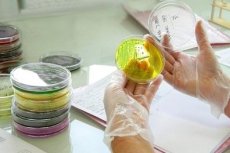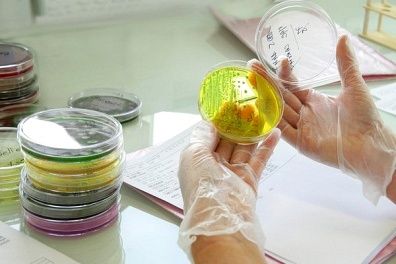Bacteriologist
Last reviewed: 23.04.2024

All iLive content is medically reviewed or fact checked to ensure as much factual accuracy as possible.
We have strict sourcing guidelines and only link to reputable media sites, academic research institutions and, whenever possible, medically peer reviewed studies. Note that the numbers in parentheses ([1], [2], etc.) are clickable links to these studies.
If you feel that any of our content is inaccurate, out-of-date, or otherwise questionable, please select it and press Ctrl + Enter.

Bacteria are everywhere and everywhere, therefore, "catching up" the disease caused by bacteria is simple. In addition, these microscopic creatures can affect the body in the most unpredictable manner. For these reasons, we are asking ourselves who is treating the diseases, the provocateurs of which are diseases, the bacteriologist and his competence, and of course what to do in order to minimize the likelihood of the disease.
A bacteriologist is relevant not only in the presence of a certain disease, but for preventive purposes, especially for those with small children at home. He can advise on precautions, carry out diagnosis and prescribe treatment.
Who is a bacteriologist?
From the name it is clear that a bacteriologist is a doctor who specializes in bacteriology. But, why such a narrow name? Why are not viruses or other microorganisms included here? Why only bacteria?

First, bacteria and other microorganisms have different nature, structure and, accordingly, have different properties, which lead to certain consequences - to diseases.
Secondly, there is a whole list of diseases, the cause of which is bacteria, which are the same set. And if in bacteriology to add more and fungal microbes and viruses, then this will have a more general name - microbiology.
It was for these reasons that it was decided to make a narrower specialization - a bacteriologist who is directly concerned with the study of bacteria.
When should I go to a bacteriologist?
The bacteriologist is the same infectious disease specialist, only in a narrower sense. Therefore, it should be addressed if there is a suspicion of the presence of diseases that have arisen on the basis of such microorganisms:
- aerobes - streptococci, staphylococci, enterococci, enterebacteria, nonfermenting),
- Naerobes - Veilonella, Porphyromonas, Prevotella, Peptostreptococcus, Propionibacterium, Bacteroides, Fusobacterium, Actinomyces, Gemella, Eubacterium, Clostridium.
- Before anything is analyzed, a bacteriologist, prescribes an examination based on tests, including bacteriological culture.
What tests should I take when I contact a bacteriologist?
It is clear that the bacteriologist is appointing the surrender of bacteriological tests. They surrender in bacteriological laboratories, which can be self-supporting structures or located at some institution, for example, venereology, sanepidemstantsiya.
Let us pass to the analysis. Bacteriological analysis of blood is given in the case of granulocytopenia, leukocytosis, low body temperature, fever. In these cases, the blood is examined for bacteremia, which is caused by virtually any microbes. Of course, if a person uses antimicrobials, the results of the tests can be slightly distorted. The most reliable result is if the patient is taking blood at a time when he suffers from chills and high fever, as during this period, more intensely attack the human body than in his usual state.
The amount of blood needed to identify the cause of the disease:
- newborns: 1 - 2 ml,
- children: 2 - 5 ml,
- adults: 10 ml.
Analyzes of urine on the maintenance of bacteria do not require preliminary preparation of the patient. Before taking the tests, you should wash your genitals, and collect the morning urine in a sterile vessel. Such an analysis is usually performed to identify bacteria in the bladder, kidneys.
Analysis of stool reveals intestinal infections, immediately and dysbacteriosis of salmonella.
Similarly, if the infection is in the wound obtained during the trauma, they can diagnose pus from the wound.
In addition, biochemical analyzes are carried out by gynecologists for the presence of STDs, for example, chlamydia, for this is taken a swab from the genital organs. The same tests and conducts the venereologist. But the analysis is carried out by a bacteriologist with the help of special equipment.
What diagnostic methods does the bacteriologist use?
At the present stage of the development of medicine, several types of diagnostics are distinguished for the detection of infection in the body, we will consider those that the bacteriologist uses:
- identification of pure cultures. The presence of bacteria is determined by biochemical, cultural, morphological, tinctorial and toxigenic features regarding virulence and antigenic structure. This process is carried out through bacteriological, biological and immune examinations. This method was called mechanical separation of microbes. Due to the fact that it is too time-consuming, it is rarely used in laboratory studies,
- colony - the concentration of bacteria of one species that were formed in the process of dividing one bacterial cell under cultured conditions,
- the cultural characteristics of bacteria are determined by the morphology of the colonies and the characteristics of the development of culture on the nutrient habitat,
- Biochemical characteristics of bacteria are established using a set of enzymes of one variety.
The bacteriologist selects the method for analysis, which he considers optimal for detecting a particular disease, for example, tuberculosis can be examined by culture, fluorescent microscopy, BACTEC, and so on.
What does a bacteriologist do?
If a specialist whose qualification is directed to the study of bacteria, then, of course, he will deal with the causes of infectious diseases, where bacteria, their morphological, genetic, antigenic and similar properties are implicated. Similarly, the bacteriologist determines the methods and methods of diagnosis, treatment and prevention of bacteriological diseases.
In addition to diseases, the bacteriologist controls food products! So, if someone has suspicions about the sterility of some food products, you can safely turn to him. He under the microscope will analyze the object for the presence of bacteria. We will not be aggravated in the methods of researching products, we will consider his competence as a doctor.
What diseases are treated by a bacteriologist?
To answer this question it is possible shortly: the bacteriologist treats all diseases which have arisen on soil of bacteria.
Let's consider what diseases can be:
- a dysbacteriosis. Most often, they suffer children who are all pulling into their mouth. Also, the cause of this effect can be and antibiotics,
- salmonellosis. As a rule, the transmitters of bacteria of this disease are animals and products of animal origin, for example, eggs,
- Gram-negative rod-like bacteria or E. Coli, which provokes a whole complex of ailments, for example, diarrhea, cystitis, prostatitis and so on,
- Staphylococcus is a muck that seems omnipresent. And, in addition, very often occurs in children. This kind of bacteria can cause dysbiosis and a number of other diseases.
In fact, the diseases that are treated by a bacteriologist are much greater, especially since almost 10,000 species of bacteria are known, and each of them provokes several diseases.
Advices of a bacteriologist
Bacteriologist, like any other infectious disease doctor, a microbiologist always gives the most basic advice: observe the rules of hygiene! In transport, on the way to the store or home, we come into contact with the environment, which is full of "living creatures", including microorganisms. If microbes get into the body, serious illness, for example, dysentery, can occur. In addition, we do not know who we were talking with, that is, with a healthy or a sick person. Concerning intestinal infections, I would like to say that they arise, more often than not, due to the fact that unwashed or unwashed products in general enter our esophagus. Further, you can not buy unproven food from grandmothers, for example, homemade milk or eggs, which can result from salmonellosis.
Another is not a little important warning: protect yourself during intercourse, well, all are adults, trust is trust, and gonorrhea is a serious and painful thing.
The bacteriologist advises everyone who is going on a hike or to spend an active vacation, do not forget about antiseptic means, as open wounds (which are easy to get on the hike, especially for children) are the best place for dislocation of various microbes, not just bacteria. Therefore, they need to be processed, for example, green.
 [5]
[5]
